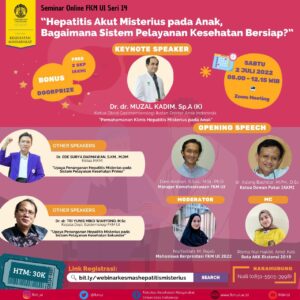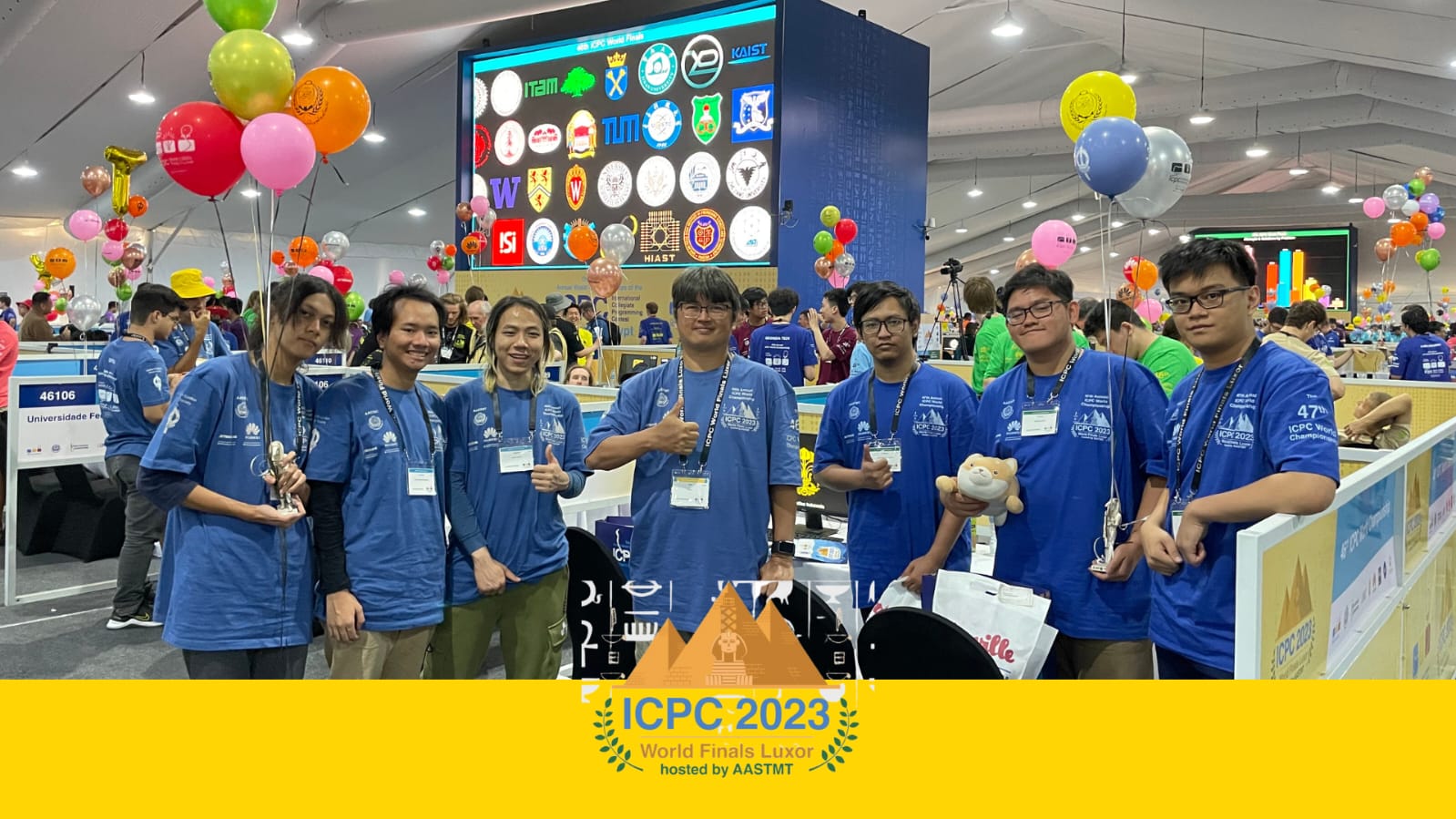There has been recently a lot of buzz going on about a “mysterious” strand of hepatitis affecting children in particular. This disease is speculated to be caused by adenovirus 41F, a virus found in 72 percent of the cases. On Saturday (3/7), the Faculty of Public Health, Universitas Indonesia (FKM UI) held a webinar’ titled “Acute Hepatitis among Children, How is the Public Healthcare System to Prepare Itself?” in order to address concern surrounding this new variety of hypothesis. Among the speakers present were the Head of the Indonesian Paediatrician Association (IDAI) Gastroenterology Division, Dr. dr. Muzal Kadim, Sp.A(K)., who reported that, based on research findings, about 70 cases of the disease has been reported in Indonesia as per 24 June 2022, 16 of them being probable cases. Among the discovered criteria of the disease are: patients being less than 16 years of age, infection happening on or after 1 October 2021, Serum Glutamic Pyruvate Transaminase (SGPT) under 500 IU/L, and patient not being infected by hepatitis A to E.
According to Dr. Muzal, the disease that most resembles this mysterious contagion is Hepatitis A. The public is well advised to constantly maintain dietary hygiene, since Hepatitis A has been commonly transmitted through the digestive tract. Hepatitis A is commonly found in densely populated residential areas and schools (including boarding schools). This mysterious form of hepatitis has many clinical symptoms in common with Hepatitis A, such as fever, fatigue, loss of appetite, stomachache, and jaundice.

“In order to prepare for cases of this mysterious hepatitis, health workers should examine clinical symptoms on children before conducting testing for virus and carrying out preventive counseling towards their parents,” Dr. Muzal said.
The Head of the Indonesian Association of Public Health Experts (IAKMI) Expert Council, dr. Adang Bachtiar, M.PH., D.Sc., stated, in the webinar’s keynote, that the event is an opportunity for students, in particular FKM students, to acquire knowledge and insight on healthcare systems, especially primary and secondary healthcare systems. “Primary and secondary healthcare systems are a part of a complete healthcare system, which includes human health issues and independence, on the part of communities, in living a healthy life. We hope, therefore, that this [the webinar] can prepare students to contribute, in the future, in the public.”
Meanwhile, the FKM UI Manager of Student Affairs, Dien Anshari, S.Sos., M.Si., Ph.D., saw in the webinar not only a means to iequip the students attending with what the faculty sees as graduate competences, but also a form of contribution, on the students’ part, towards the community. “The information within this webinar is expected to encourage students to be able to make the best choices regarding current issues in health, in particular acute hepatitis on children.”
Public health does not solely focus on the health of a community; it also considers the health of the nation, i.e. the health of every individual within the nation. The state plays a role in building and promoting public facilities, public health, and public administration. The Head of IAKMI, Dr. Ede Surya Darmawan, S.K.M., M.D.M. (who, coincidentally, is also a lecturer in the Department of Health Policy and Administration) explained the role each plays in the society. Public facilities make public life easier, public health aims towards the health of members of the society while making optimal use of public facilities, and public administration plays a role in ensuring that people live healthy lives and public facilities are in order, so that people may assume productive roles in society.
Dr. Ede stressed the importance of a good and adaptive healthcare system, one which may deal with various threats, especially this new “mysterious” variety of hepatitis infecting children. Public health is a responsibility shared by the community, health centres (puskesmas), clinics, hospitals, and other parties. The tendency in Indonesia, however, is to concentrate prevention or intervention only on hospitals, or even health centres possessing limited amounts of personnel and laboratories.
“Disease intervention is not only the hospital’s role. Investment in prevention towards [sic] communities are, more often than not, overlooked, as if communities are empowered to do things on their own.” Investment should instead focus on empowering the community, Dr. Ede commented.
The Head of the FKM UI Epidemiology Department, Dr. dr. Tri Yunis Miko Wahyono, M.Sc., preferred to describe the new variety of hepatitis using the term ‘unidentified’, rather than referring to the variety as a ‘mysterious’ one. He chose to use the term ‘unidentified’ because this variety is not one that has newly occurred in Indonesia. “I think it has been known; what hasn’t been known is due to the yet-unsolved diagnosis. If the diagnosis is unresolved,” he explained, the disease should not be referred to as “mysterious, but [instead] unidentified. Therefore, there aren’t really any ‘mysterious’ diseases.”
Acute hepatitis among children is handled in secondary healthcare, according to Dr. Miko. There are three levels in healthcare and health services. At the lowest layer there are the primary services, at the intermediate layer secondary services, and at the uppermost layer tertiary services. The state of secondary healthcare services, according to Dr. Miko, is still far from that demanded by diagnostic standards.
Indonesia’s healthcare system is far from what may be considered “well-organised” and is not yet “steady” enough, Dr. Miko commented. “There are several challenges to face in the future, such as the primary services, which should be improved conceptually; integration between services — which has been set as a target for 2024; and a better service system, which is expected to be achieved by 2030. These challenges will be achieved [sic] not only with the participation of the healthcare sector, but also with synergy from political aspects, because policies from any sector, the healthcare sector included, are inseparable from political decisions.”



